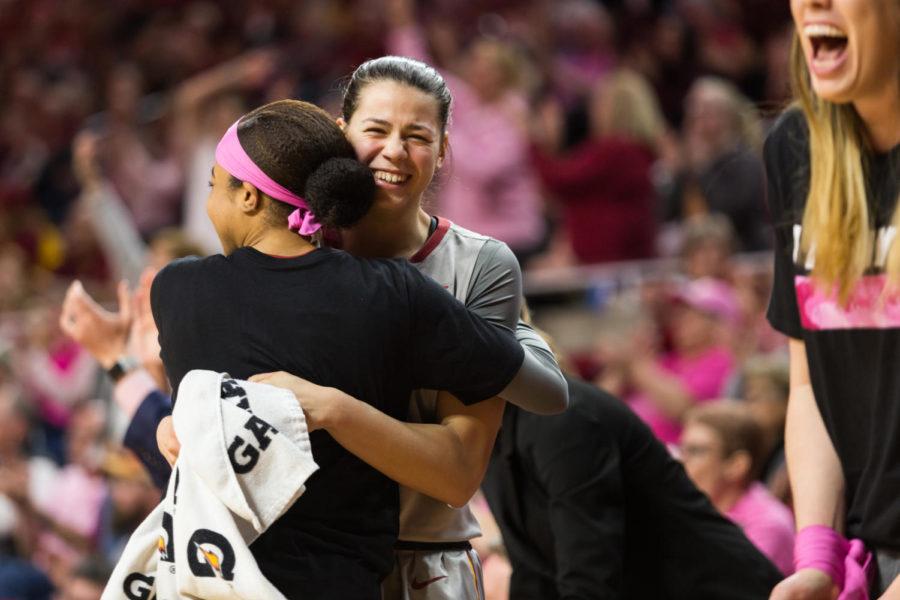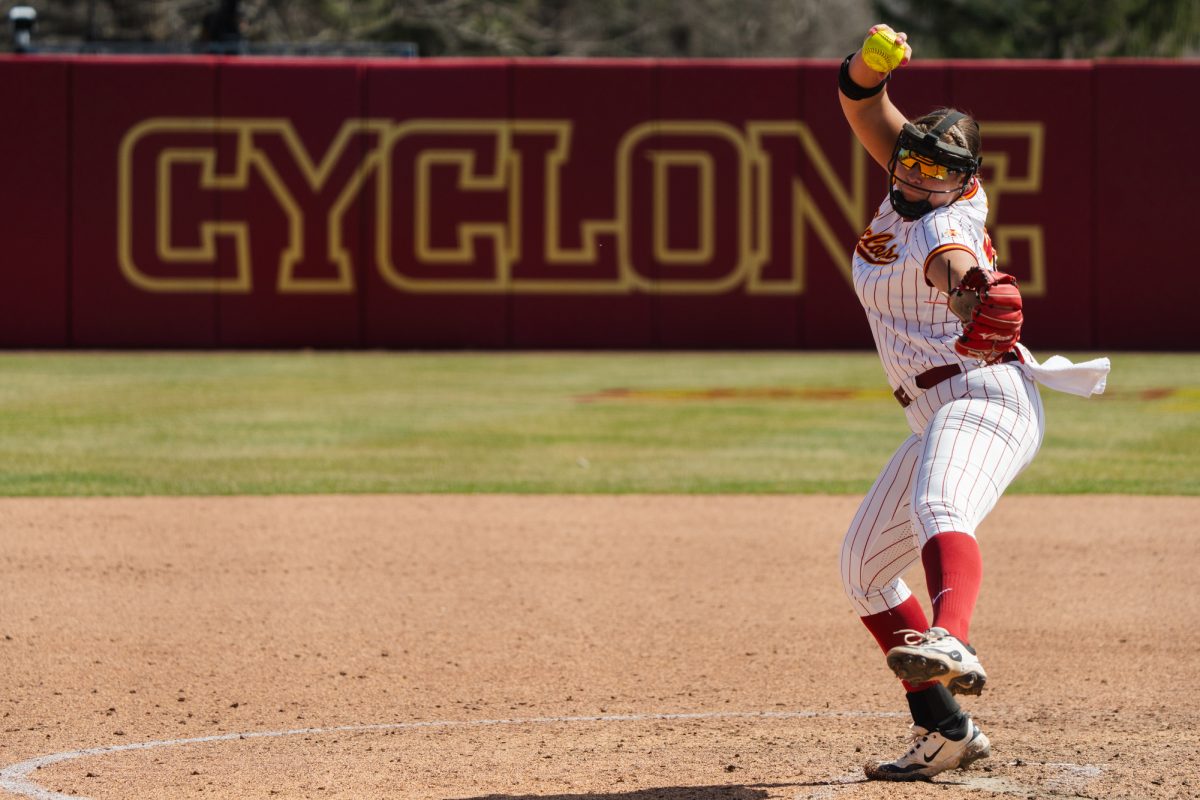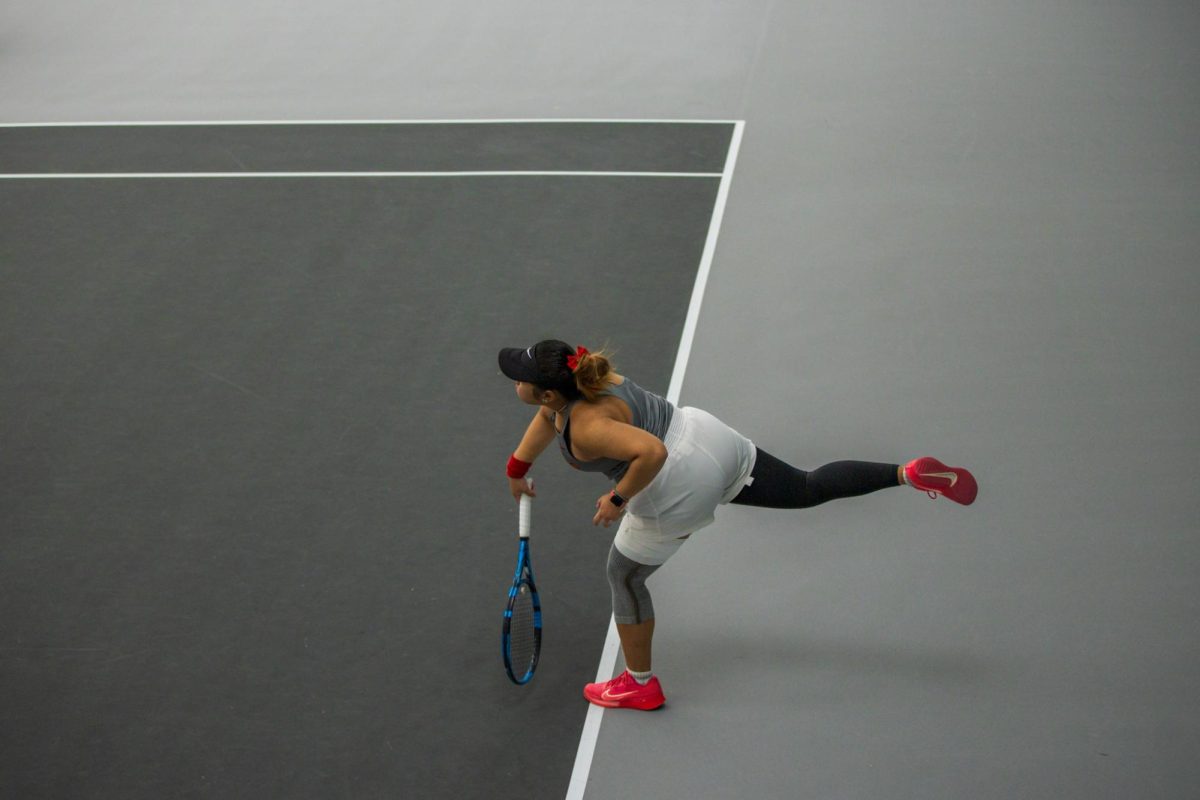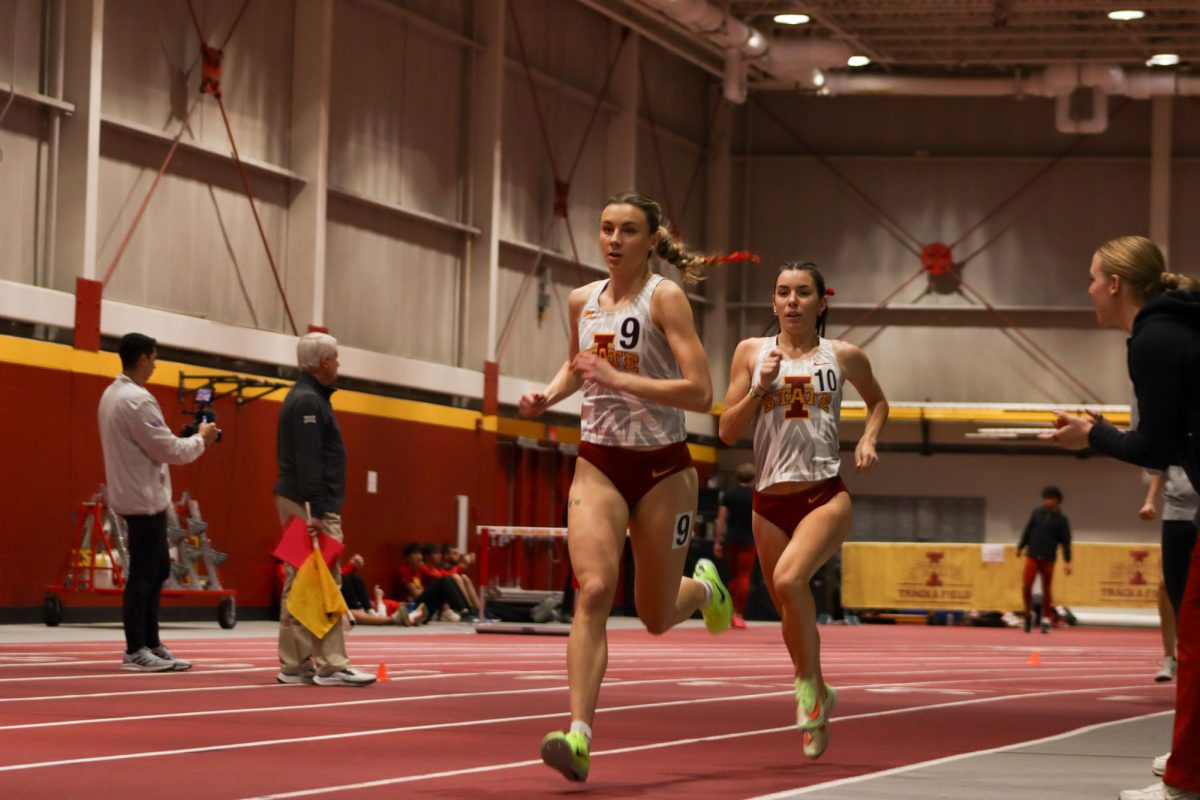Home away from home: Iowa State’s focus on international recruiting propels program forward
January 28, 2019
Basketball may be an American-based sport, but it’s long since become an international game of choice.
That’s never been more evident than with the growth of basketball around the world. Thanks in large part to the internet and social media, basketball, particularly the NBA and WNBA, has experienced major surge in popularity.
Among those benefiting from that surge are American college basketball teams, including the Iowa State Cyclones. Higher interest in basketball internationally has meant more players, and more players has meant a wider talent pool, which Iowa State is certainly benefiting from.
As it stands, there are currently four players from international backgrounds currently on Iowa State’s roster: seniors Bridget Carleton of Canada and Ines Nezerwa of Burundi, junior Adriana Camber of Sweden and sophomore Lauren Mills of Australia.
The Cyclones have benefited from international recruiting and the increased global popularity of basketball. But, how does an international player end up in Ames, Iowa?
First contact
As it turns out, the coaching staff doesn’t really have a set strategy when it comes to international recruitment.
Actually, according to the staff, the fact that there are so many international players on the team right now is by pure coincidence. You won’t find staff members scouring the globe trying to lure the next big prospect to Ames, and you won’t find them looking for hidden gems around the world.
In fact, international recruiting really isn’t much of an emphasis at all for Fennelly’s staff. It sounds cliché, but the coaches say that the primary goal is always to find and sign the best players that it possibly can, while still ensuring that the personalities and goals of those players’ mesh with of the team’s.
With methods of communication becoming more advanced and basketball becoming a more international sport, however, the pool of players that could be a potential fit with the team has never been wider. And like any other team trying to win and build a culture, the Cyclones are more than happy to do their due diligence.
“It’s kind of by accident. I don’t know if there’d ever be an emphasis for it,” Bill said. “But I think there’s more (international players) that want to come to the states. It used to be that a lot of them didn’t have the resources or didn’t know enough about the academic component, because you don’t grow up in Sweden understanding NCAA rules as to how to get into college.
A primary reason for that desire to come to the U.S., Fennelly said, is the desire to play basketball against the best competition and hone their craft, while simultaneously receiving a quality education.
“The thing that’s happened in almost every other country now is that they see the basketball in the states as being the best in the world,” Bill said. “If they want their country to get better, they send (players) here and they play against good competition, they get coached and then they go back and represent their country.”
The players’ backgrounds may be incredibly different, but the process of recruiting them is often similar. Like most professions, having a wide network helps significantly, and oftentimes the process is set in motion after coaches get sort of lead from someone they know within the basketball community, be it a coach or recruiting service.
That’s when the process is set in motion.
Recruitment
No player ever has the exact same recruitment, but Iowa State’s coaches generally follow a similar script when they begin the recruiting process with international players.
“You start on Facebook or any other social media platform when you talk to a foreign player, said Bill’s son and Iowa State assistant coach Billy Fennelly. “And then you start exchanging film because it costs so much money to go over there.”
Such was the case when it came to the recruitment of players like Camber and Mills, who were both initially contacted by Iowa State via Facebook. Camber’s recruitment in Sweden actually began because of a relationship with her high school coach, who previously worked with Billy at the University of Maryland.
Camber was an accomplished player in Sweden before Iowa State, winning several accolades with multiple different club teams. She parlayed this into becoming a member of Sweden’s national team, and ultimately earned a five-star rating from at one of Europe’s top-rated recruiting services.
Though Camber had been to the United States on a vacation to the east coast, she knew nothing about the place she’d soon call home.
“I had no clue about Ames, Iowa,” Camber said “I didn’t know Iowa State was a school, and I couldn’t point out Iowa on a map.”
Mills was in that same boat, but she too aspired to come to America for college basketball, especially after hearing from past teammates about what a good experience it was.
What specifically made Mills unique was the fact that she excelled in not just basketball, but also another sport called netball, which shares similarities to basketball and has transferable qualities, but is ultimately much different in style.
“It’s definitely a bit more stagnant compared to basketball,” Mills said. “My position was shooter, so I was responsible for making goals for the team. You can’t dribble the ball, so you have to be really accurate passing. It’s quite a fast game and there’s no backboard on the net, so that makes it more challenging as well.”
Due in large part because of their accomplishments and individual transferable skill sets, the two were recruited heavily by Billy. From a man they had never met, the two learned more and more about a school they had never even heard of, and slowly a relationship began to form.
At times, maintaining these relationships can be a tremendous challenge. For players like Camber and Mills, the time zone differences can be substantial, meaning that it takes significant effort from both sides to make things work.
Sometimes, that can mean waking up in the dead of the night to talk to a recruit or their family, acting as a late-night tour guide over the phone.
“You kind of walk them through virtual tours from thousands of miles away,” Billy said.
Then, there’s also the logistical concerns as it relates to eligibility. That was especially prevalent with Nezerwa, who started college in Rwanda before transferring to Jacksonville College in Jacksonville, Texas. Her eligibility was a major source of concern that, ultimately, scared other colleges away before Iowa State took a chance.
Carleton didn’t have to jump through nearly as many hoops during her recruitment, but she did acknowledge the extra work that has to be done in order to secure eligibility.
“There’s different things that we have to do because we’re international students than American students do,” Carleton said.
Getting to Ames
The virtual tours are helpful for getting a feel, but what if a recruit wants to see what the real thing is all about?
Well, sometimes that can get a little tricky.
Because of distance and other commitments, prospects usually only get one chance to visit campus. Sometimes, they don’t even get that. Camber, for instance, was only allowed one visit to a college because of upcoming games. She ultimately chose to visit Iowa State, but it was due in large part because of the relationship that she established with Billy and the staff.
Sometimes, prospects never even visit at all, essentially making a life-changing decision based solely on their own research, in addition to what they’ve heard from coaches. If a school is fortunate enough to get a visit, a good-first impression is critical, because they likely won’t get another opportunity.
“The initial thing is getting them and their families to a point where they’re comfortable,” Bill said.
This is especially important, because coaches and players know that most international prospects, at least those not from North America anyway, won’t get many chances to go home once they’re enrolled in college.
They may go home after the season, but during the school year, players are essentially at their school for many months at a time.
A Second Home
That’s why the coaching staff’s main focus throughout the visit is ensuring family members that their daughter will be in good hands at Iowa State. Sure, they emphasize the program’s points of pride: the Sukup Basketball complex, the workout facilities, the tradition of success, etc., but the crux of the visit usually comes down to the same basic tenets:
A player will get a chance to play high-level basketball, they’ll get a quality education, and they’ll feel safe and welcome on the team and on the campus.
“Honestly, it’s our kids that are already here,” Billy said. “We ask a lot of our kids that are here and we recruit a certain type of kid. All of our kids are great and come from great families, and it’s comforting to know the kind of girls that (international recruits) are going to be around.”
What also helps matters for recruiting international kids, according to Bill, is the fact that those types of players don’t have any preconceived notions when it comes to college basketball.
Where top U.S. prospects may feel obligated to go to a traditional powerhouse program, such as UConn, Notre Dame or Stanford, Bill said that international prospects tend to be more grateful just for the opportunity to play college basketball.
When no bias exists, it puts Iowa State an even playing field and gives them a foot in the door that they may not otherwise have. From there, it’s all about outworking other schools when it comes to maintaining relationships, which Billy and the staff have certainly done with their recruits.
“Things were different from (Iowa State),” said Ines Nezerwa. “From the first time they talked to me, they worked hard. I came to visit and I loved the place.”
Carleton and Camber also committed after visiting the campus and getting a tour of the facility, with Camber actually committing during her visit on the spot. Some don’t even need that much, as was the case with Mills, who committed before ever actually seeing the campus in person.
What it all comes back to is those relationships. Because of the work put it in, players often know what they’re getting into before they commit. The visit, then, almost becomes a formality.
“There’s a comfort level for (international players) and their families,” Bill said. “Personally and academically, you’re going to be taken care of.”
That’s the heart of the coaching staff pitch to recruits. And following through on that promise is why when an international recruit commits to the Cyclones, it’s rare to ever see them leave.
“I think for kids that are dead serious about basketball, I don’t care if they’re from Iowa, Florida or Australia, we are a place where, if you’re serious about basketball, we should be somewhere that you look at.”







